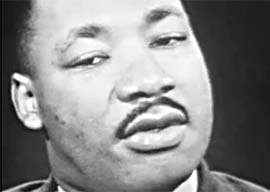
January 16, 2012

Dr. Martin Luther King Jr.
Perhaps the most insulting thing anyone can say about MLK is that he was the unwitting tool of a government that saw tremendous growth potential in the “racial justice” biz. What exactly is meant by “civil rights,” anyway? Is that a nice way of saying, “The utter obliteration of the right to freely associate?” Define these indefinables, please. What is meant by “equality”—and how much will this cost me? What do you mean by “racial justice,” “social justice,” and just plain “justice,” and have you done any price-shopping on it? What’s the planned completion date for this ambitious public-works project? How long does my term of indenture last? When will the debt be paid? Do I have a basic human civil right not to pay?
Although his “I Have a Dream” speech gives lip service—no lip jokes, I swear—to “freedom,” MLK spoke of “an inescapable network of mutuality, tied in a single garment of destiny” and “the interrelated structure of reality” and how “Whatever affects one directly, affects all indirectly.” That doesn’t sound like “freedom” as I define it. Rather, it sounds like a giant Gordian knot of pain-in-the-ass codependency.
Any idea when we’ll be “Free at last!” of MLK memorials? Now that would be freedom.
Although he established his rep on a nonviolent platform, the whole showing-up-in-huge-crowds-and-being-nonviolent thing strikes me at the very least as passive-aggressive. As with the Occupy movement, you have to be a wee bit of an asshole to insist on planting your behind where you’re not wanted. Although in recent years the historical narrative has been sanitized to portray only white club-wielding police as the perpetrators of violence throughout King’s numerous marches and mass demonstrations, there’s also evidence that his own protesters were less than peaceful on numerous occasions. The return to Memphis that ended in his murder was aimed at marching once again on behalf of black sanitation workers whose protests had previously turned violent. Some have suggested that the more than 100 riots that erupted nationwide after his murder frightened mainstream white America into making an uneasy truce with American blacks—don’t burn down our cities, and we’ll give you our lunch money and promise to stop calling you bad names.
Although he said he dreamed of a day when people “will not be judged by the color of their skin but by the content of their character,” the affirmative-action schemes he endorsed (he spoke in favor of “preferential treatment” and proposed that “if a city has a 30% Negro population, then it is logical to assume that Negroes should have at least 30% of the jobs in any particular company”) are explicitly racial and have zilch to do with character. And I’m not quite sure that someone who claimed “the problems in the world today…must be blamed on the whole doctrine of white supremacy” and that “if one black person is down, we are all down” cared all that much about getting beyond skin color. Are things any less racial these days than they were in the 1960s? Not so far as I can tell. The same media brain-slaves who lick the soles of King’s feet continue to race-bait and race-bait, all in the name of anti-racism.
There’s also his infamous philandering—he apparently philandered, re-philandered, and kept on with his phreely philanderous ways until there was nothing left to philander. We know that he was great at oratory, but until the FBI files are unsealed, we’ll never know if he was any good at oral sex. He reputedly hosted multiple orgies while on the road. In private hotel rooms after the speeches, “We shall overcome” apparently switched to “We shall cum over and over.” King even allegedly squandered SCLC funds to pay for booze and whores. Most notable is the allegation that he spent the night before he was murdered inside a Memphis motel room with three separate prostitutes and that it got a little rough with the third one. According to Michael Eric Dyson citing Ralph David Abernathy:
[King] shouted and knocked her across the bed. It was more of a shove than a real blow, but for a short man, Martin had a prodigious strength that always surprised me. She leapt up to fight, and for a moment they were engaged in a full-blown fight, with Martin clearly winning.
Hey, not that there’s anything wrong with any of this! I’m not one to judge, but neither do I claim to be a saint. But isn’t all this at least sufficient to publicly disrobe Martin Luther King, Jr. of sainthood’s holy cloak?
After nearly 1,000 mostly dilapidated American streets named in his honor and a select number of cushy jobs awarded in media, athletics, education, and government, what has MLK achieved for American blacks in real terms? Have you seen Birmingham or Memphis lately? Do these latter-day urban creatures seem somehow nobler than the black men in porkpie hats and Buddy Holly glasses who marched for their amorphous “rights” in the 1960s? To my blue eyes, the new jacks seem a few rungs down from their forebears on the evolutionary ladder.
I’ve tried to think of what King achieved that I’d want to celebrate, but I’m drawing blanks. I’ve never wanted to sit next to someone of any color at a lunch counter, so that’s a moot point. I know that American restaurants are now integrated, which means that all waiters and waitresses, regardless of their skin color, now realize that black people don’t like to tip.
I resent the fact that I’m required to pay a guilt tax due to his presumed accomplishments. I think it’s absurd that if I so much as question his sanctity, I’m automatically a sinner.
Beyond all that, the only thing Martin Luther King means to me is that on the third Monday of every January, I don’t get my mail delivered.